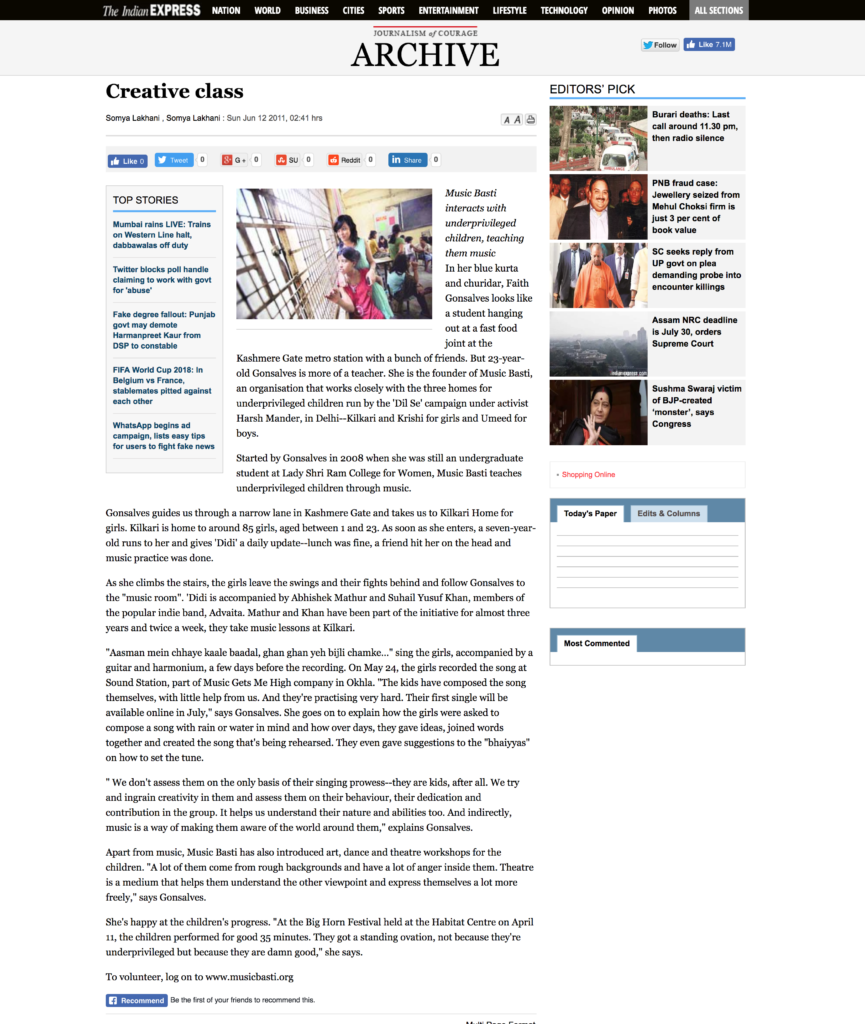This article first appeared in The Indian Express on the 12th of June, 2011. Written by Somya Lakhani
Music Basti interacts with underprivileged children, teaching them music
In her blue kurta and churidar, Faith Gonsalves looks like a student hanging out at a fast food joint at the Kashmere Gate metro station with a bunch of friends. But 23-year-old Gonsalves is more of a teacher. She is the founder of Music Basti, an organisation that works closely with the three homes for underprivileged children run by the ‘Dil Se’ campaign under activist Harsh Mander, in Delhi–Kilkari and Krishi for girls and Umeed for boys.
Started by Gonsalves in 2008 when she was still an undergraduate student at Lady Shri Ram College for Women, Music Basti teaches underprivileged children through music.
Gonsalves guides us through a narrow lane in Kashmere Gate and takes us to Kilkari Home for girls. Kilkari is home to around 85 girls, aged between 1 and 23. As soon as she enters, a seven-year-old runs to her and gives ‘Didi’ a daily update–lunch was fine, a friend hit her on the head and music practice was done.
As she climbs the stairs, the girls leave the swings and their fights behind and follow Gonsalves to the “music room”. ‘Didi is accompanied by Abhishek Mathur and Suhail Yusuf Khan, members of the popular indie band, Advaita. Mathur and Khan have been part of the initiative for almost three years and twice a week, they take music lessons at Kilkari.
“Aasman mein chhaye kaale baadal, ghan ghan yeh bijli chamke…” sing the girls, accompanied by a guitar and harmonium, a few days before the recording. On May 24, the girls recorded the song at Sound Station, part of Music Gets Me High company in Okhla. “The kids have composed the song themselves, with little help from us. And they’re practising very hard. Their first single will be available online in July,” says Gonsalves. She goes on to explain how the girls were asked to compose a song with rain or water in mind and how over days, they gave ideas, joined words together and created the song that’s being rehearsed. They even gave suggestions to the “bhaiyyas” on how to set the tune.
” We don’t assess them on the only basis of their singing prowess–they are kids, after all. We try and ingrain creativity in them and assess them on their behaviour, their dedication and contribution in the group. It helps us understand their nature and abilities too. And indirectly, music is a way of making them aware of the world around them,” explains Gonsalves.
Apart from music, Music Basti has also introduced art, dance and theatre workshops for the children. “A lot of them come from rough backgrounds and have a lot of anger inside them. Theatre is a medium that helps them understand the other viewpoint and express themselves a lot more freely,” says Gonsalves.
She’s happy at the children’s progress. “At the Big Horn Festival held at the Habitat Centre on April 11, the children performed for good 35 minutes. They got a standing ovation, not because they’re underprivileged but because they are damn good,” she says.
Original Article

